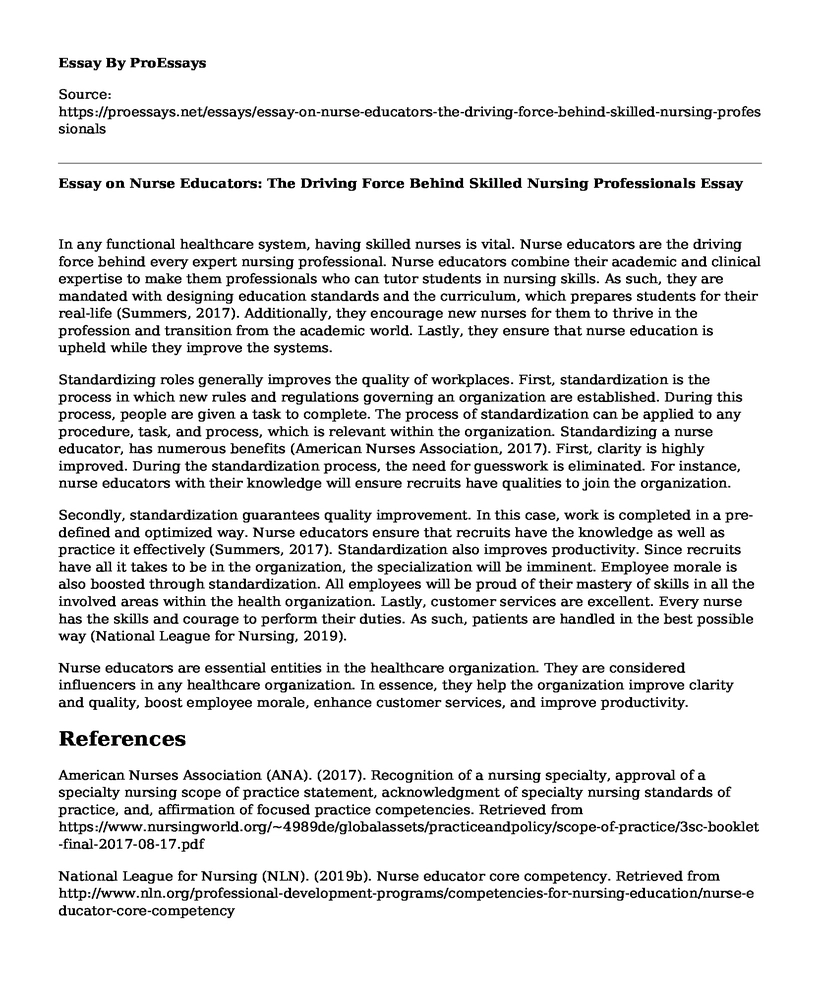In any functional healthcare system, having skilled nurses is vital. Nurse educators are the driving force behind every expert nursing professional. Nurse educators combine their academic and clinical expertise to make them professionals who can tutor students in nursing skills. As such, they are mandated with designing education standards and the curriculum, which prepares students for their real-life (Summers, 2017). Additionally, they encourage new nurses for them to thrive in the profession and transition from the academic world. Lastly, they ensure that nurse education is upheld while they improve the systems.
Standardizing roles generally improves the quality of workplaces. First, standardization is the process in which new rules and regulations governing an organization are established. During this process, people are given a task to complete. The process of standardization can be applied to any procedure, task, and process, which is relevant within the organization. Standardizing a nurse educator, has numerous benefits (American Nurses Association, 2017). First, clarity is highly improved. During the standardization process, the need for guesswork is eliminated. For instance, nurse educators with their knowledge will ensure recruits have qualities to join the organization.
Secondly, standardization guarantees quality improvement. In this case, work is completed in a pre-defined and optimized way. Nurse educators ensure that recruits have the knowledge as well as practice it effectively (Summers, 2017). Standardization also improves productivity. Since recruits have all it takes to be in the organization, the specialization will be imminent. Employee morale is also boosted through standardization. All employees will be proud of their mastery of skills in all the involved areas within the health organization. Lastly, customer services are excellent. Every nurse has the skills and courage to perform their duties. As such, patients are handled in the best possible way (National League for Nursing, 2019).
Nurse educators are essential entities in the healthcare organization. They are considered influencers in any healthcare organization. In essence, they help the organization improve clarity and quality, boost employee morale, enhance customer services, and improve productivity.
References
American Nurses Association (ANA). (2017). Recognition of a nursing specialty, approval of a specialty nursing scope of practice statement, acknowledgment of specialty nursing standards of practice, and, affirmation of focused practice competencies. Retrieved from https://www.nursingworld.org/~4989de/globalassets/practiceandpolicy/scope-of-practice/3sc-booklet-final-2017-08-17.pdf
National League for Nursing (NLN). (2019b). Nurse educator core competency. Retrieved from http://www.nln.org/professional-development-programs/competencies-for-nursing-education/nurse-educator-core-competency
Summers, J. A. (2017). Developing competencies in the novice nurse educator: An integrative review. Teaching and learning in Nursing, 12(4), 263-276.
Cite this page
Essay on Nurse Educators: The Driving Force Behind Skilled Nursing Professionals. (2023, Apr 09). Retrieved from https://proessays.net/essays/essay-on-nurse-educators-the-driving-force-behind-skilled-nursing-professionals
If you are the original author of this essay and no longer wish to have it published on the ProEssays website, please click below to request its removal:
- Effective Teaching Practices for English Language Learners in Reading Comprehension
- How HR Management Can Contribute To High Performance? - Research Paper
- Essay Example on Ethical Challenges of 1950s Tacit Consent in NIH Research
- Essay Sample on Tech Workshop: A Reflection on Group Learning & Self-Development
- Essay Example on Modernizing Hospital Data Collection: Leveraging Tech for Efficiency
- Group Singing: Benefits to Mental & Physical Health - Essay Sample
- Research Paper Example on Unlocking the Benefits of Internationalizing Higher Education







